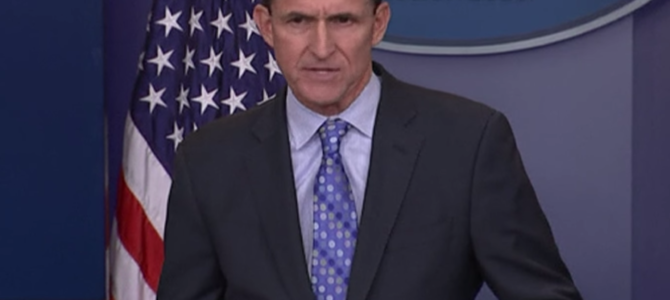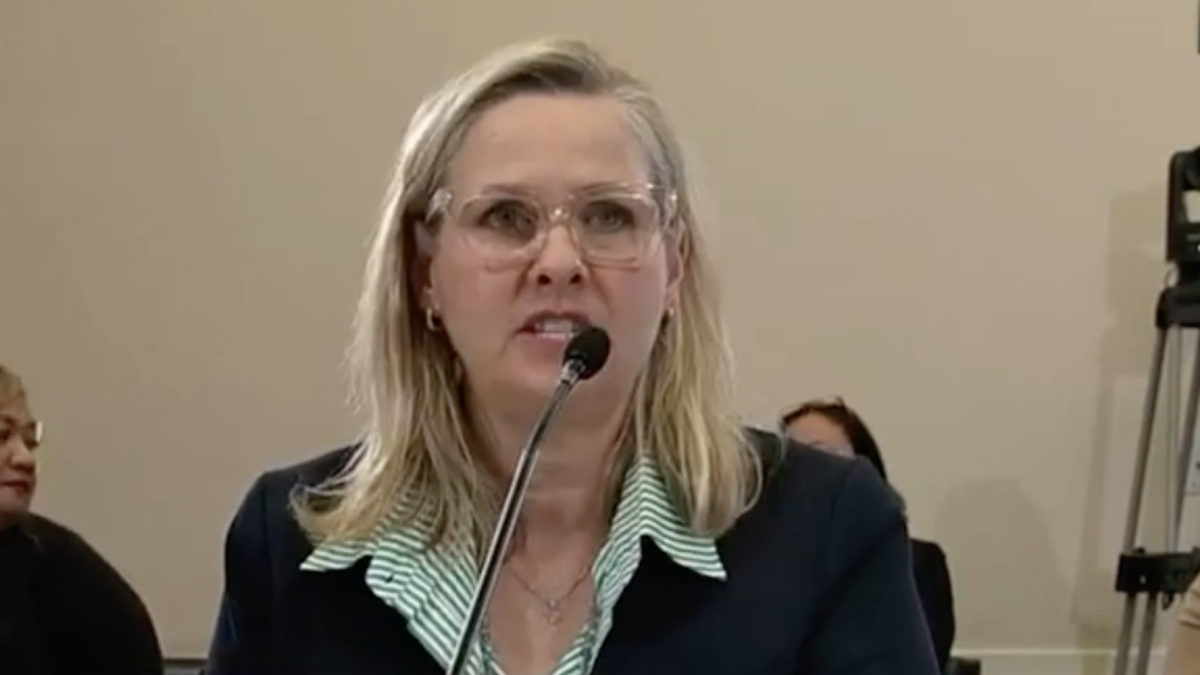
Two court filings from the last month suggest U.S. and British intelligence agencies used the Russian-born Svetlana Lokhova and a complicit press to peddle the Russia-collusion narrative and to destroy Trump’s former national security adviser Michael Flynn. But the masterminds behind Spygate made a fatal mistake in casting Lokhova as a Russian operative with designs on Flynn, as her recently filed amended complaint proves.
Lokhova, who left Russia as a teen and became a British citizen in 2002, made headlines in May 2019, when she sued outed informant and “ratf-cker” Stefan Halper. Lokhova’s original complaint claimed Halper, the Wall Street Journal, the New York Times, the Washington Post, and MSNBC defamed her.
The defendants “embroiled an innocent woman in a conspiracy to undo the 2016 Presidential election and topple the President of the United States of America,” Lokhova alleged. She continued: “Halper manufactured and published numerous false and defamatory statements,” including that she was “‘a Russian spy’ and a traitor to her country and that Plaintiff had an affair with General Flynn on the orders of Russian intelligence.”
Her initial complaint laid out the details of the alleged conspiracy between Halper and the media outlets. But it was the amended complaint Lokhova filed at the end of August that connected Halper, British intelligence, and the press with former CIA Director John Brennan and a concerted effort to destroy Flynn — which explains why the motion to compel under seal in the Flynn criminal case earlier this month included a demand by defense counsel Sidney Powell for prosecutors to turn over the following:
All payments, notes, memos, correspondence, and instructions by and between the FBI, CIA, or DOD with Stefan Halper—going back as far as 2014—regarding Michael Flynn, Svetlana Lokhova, Mr. Richard Dearlove (of MI6), and Professor Christopher Andrew (connected with MI5) and Halper’s compensation through the DOD Office of Net Assessment as evidenced by the whistleblower complaint of Adam Lovinger, addressed in our brief.
If the year 2014 seems antiquated compared to the Russia-collusion narrative that didn’t hit its stride until mid-to-late 2016, that’s exactly what Lokhova thought too.
Lokhova told The Federalist that after several news organizations contacted her around the same time in March 2017 about a dinner in honor of Flynn that she had attended as a graduate student at Cambridge more than three years prior, she wondered why. “What prompted all of these different journalists to quiz me about this innocuous academic dinner gathering held in February of 2014?” Lokhova asked herself.
As a graduate student at Cambridge, Lokhova often received appeals to attend academic gatherings. Such was the case when, “in January 2014, while working to complete her Ph.D. at Cambridge University, her mentor Professor Christopher M. Andrew (‘Andrew’), and Sir Richard Dearlove (‘Dearlove’), invited Lokhova to attend a group dinner with Flynn,” who then served as President Barack Obama’s director of the Defense Intelligence Agency.
According to her complaint, the dinner served to promote the Cambridge Security Initiative (CSI), “a group chaired by Dearlove,” which sought “to advance education in international security and intelligence issues and to help support graduate students, such as Lokhova, while they were studying at Cambridge.” About 20 people attended that Feb. 28, 2014, academic event, and during the evening, Lokhova was introduced to Flynn and spoke with him briefly.
Svetlana Lokhova Learns of Claims That She Is a Spy
Fast forward three years.
“I had just given birth to my first child, when the calls and emails came, followed by these ridiculous claims that I was a Russian spy and had engaged in an inappropriate relationship with a man I had only briefly met during a university function.” Lokhova explained.
Later, she would seek out answers. “I approached the question of ‘why’ and ‘why now,’ as a historian,” Lokhova, the author of the upcoming book, “The Spy Who Changed History: The Untold Story of How the Soviet Union Stole America’s Top Secrets,” told The Federalist. Through researching newspaper archives, eyewitness accounts, and public records, she pieced together an apparent coordinated effort that connected Halper, Brennan, British intelligence, and media outlets in an effort to paint her as a Russian spy and thereby take down Flynn — and in turn, create a scandal for President Trump.
“I had known Halper at Cambridge,” Lokhova said, “but he was just a boring old academic. I couldn’t see why he was painting me as a Russian spy,” she told The Federalist, “until Halper was exposed as an informant. Then the pieces all fit together.”
Chuck Ross had already identified Halper as a London-based academic with ties to the intelligence community who had a mysterious meeting with Trump campaign adviser George Papadopoulos, when the New York Times and Washington Post ran stories in May 2018, describing in detail an unnamed CIA and FBI source. While the Times and Post omitted Halper’s name, the specifics provided outed Halper as the informant. Later, we would learn that Halper had contact with not just Papadopoulos, but also Trump adviser Carter Page and campaign chairman Sam Clovis. Now Flynn can be added to the mix.
A Coordinated Effort To Take Down Flynn — and Trump
Lokhova’s amended complaint details the Halper connection and presents a compelling case that he, along with Andrew and Dearlove — both of whom are connected to British intelligence — coordinated with Brennan and multiple media outlets to paint Lokhova as a spy in order to portray Flynn as, at best, compromised and, at worst, a traitor and Russian compatriot.
While the plot had its roots in 2014, when Lokhova briefly met Flynn, it was not executed until Feb. 19, 2017, when Lokhova’s former mentor, Christopher Andrew, penned a piece for the U.K.’s Sunday Times titled “Impulsive General Misha shoots himself in the foot.” Andrew, the former official historian of the British domestic security system, MI5, used every rhetorical device available to craft a tale of intrigue and espionage.
In his short 635-word article, Andrew turned an uneventful academic dinner into the foundation for the false narrative that Flynn — recast as “General Misha” to serve the Russia-conspiracy angle — had a love interest in a then-yet-unidentified Lokhova, described merely as “a bilingual postgraduate, with dual British-Russian nationality.” Andrew would claim in his article that “by evening’s end [Flynn] had invited her to accompany him on his next official visit to Moscow,” a claim Lokhova denies.
The Wall Street Journal picked up the story, and on March 18, 2017, it repeated the gist of Andrew’s article, while now naming Lokhova as the graduate student who supposedly had caught Flynn’s attention. On March 31, 2017, The Guardian furthered the narrative by reporting that “US intelligence officials had serious concerns about Michael Flynn’s appointment as the White House national security adviser because of his history of contacts with Moscow and his encounter with a woman who had trusted access to Russian spy agency records.” The article also identified Lokhova as the woman of concern.
Had things gone according to plan, those articles connecting the Russian-born, supposed-spy Lokhova with Flynn would have bookended former CIA director Brennan’s testimony before the House Intelligence Committee. On March 7, 2017, it was publicly announced that the House Intelligence Committee would hold an open hearing on the Russia probe, beginning on March 20, 2017. Brennan was set to testify on March 28, 2017, but just days before his scheduled appearance, then-Chairman Devin Nunes unexpectedly postponed the hearings.
John Brennan Testifies Before the Intelligence Committee
Two months later, Brennan finally testified before the House Intelligence Committee. He told the members of Congress that he had referred to the FBI information about contacts between Russians and individuals connected to the Trump campaign.
“We were uncovering information and intelligence about interactions and contacts between U.S. persons and the Russians,” Brennan told Rep. Trey Gowdy. “I encountered and am aware of information and intelligence that revealed contacts and interactions between Russian officials and U.S. persons involved in the Trump campaign,” Brennan explained, noting that “as we came upon that, we would share it with the bureau.”
Brennan refused to identify the specific individuals connected with the Trump campaign who also had contacts with Russians. Yet, in her complaint, Lokhova alleged that in that testimony, Brennan, “of course, was expressly referring to Flynn and Lokhova,” and that “the source of Brennan’s ‘intelligence’ was Halper.” Lokhova further alleged that “Brennan passed on Halper’s warning about Flynn and Lokhova to the FBI to be used in the counterintelligence operation against President Trump.”
Lokhova’s complaint provided no support for her claim that Brennan was speaking about Flynn’s interactions with her. But here’s where the timing proves key: Had Brennan appeared before the House Intelligence Committee in March, as planned, his testimony would have followed on the heels of the Wall Street Journal article about Lokhova and Flynn. And Brennan’s testimony mirrored the Wall Street Journal’s angle, so, if the timing had stood, the narrative of a Flynn-Lokhova intrigue and espionage would have stuck.
Specifically, Brennan testified to the House Intelligence Committee that “having been involved in many counterintelligence cases in the past, I know what the Russians try to do. They try to suborn individuals, and they try to get individuals, including U.S. persons, to act on their behalf, either wittingly or unwittingly.” The former CIA director then explained the “tradecraft,” “which is to identify individuals that you think are either very influential or rising stars,” and then “the Russians try to cultivate relationships with [those] individuals.”
“They won’t identify themselves as Russians or as members of the Russian government,” Brennan told the House Committee, but “they will try to develop that personal relationship, and then over time, they will try to get individuals to do things on their behalf. … And these are contacts that might have been totally, totally innocent and benign.”
Brennan then stressed “that Russian intelligence agencies do not hesitate at all to use private companies and Russian persons who are unaffiliated with the Russian government to support their objectives.” And many times, according to Brennan:
They do not even know that the person that they are interacting with is a Russian. And frequently, individuals who go along a treasonous path do not even realize they’re along that path until it gets to be a bit too late. And that’s why, again, my radar goes up early when I see certain things that I know what the Russians are trying to do, and I don’t know whether or not the targets of their efforts are as mindful of the Russian intentions as they need to be.
Brennan Testimony Aligns With Media Reporting
The ”tradecraft” Brennan cataloged for Congress matched the Wall Street Journal’s reporting of Flynn and Lokhova’s meeting. That article began by noting “Flynn interacted with a graduate student with dual Russian and British nationalities” — a “totally innocent and benign” event with a person “unaffiliated with the Russian government.”
Next, repeating the claims in the earlier U.K. Sunday Times hit piece authored by Andrew — who is described as the author of the “authorized history of MI-5, Britain’s domestic security service” — the Journal reported that by the end of the evening, “Flynn asked the woman to travel with him as a translator to Moscow on his next official visit,” and that “the two continued an email exchange on Russian history after the meeting.” Again, this matched Brennan’s summary of the Russian’s modus operandi that “they will try to develop that personal relationship and then over time, they will try to get individuals to do things on their behalf.”
The Journal followed with details of Flynn’s connections with Russian companies: “Flynn was paid tens of thousands of dollars by Russian companies, according to documents obtained by a congressional oversight committee that were released this past week.” And he “was paid $11,250 each by a Russian air cargo company that had been suspended as a vendor to the United Nations following a corruption scandal, and by a Russian cybersecurity company that was then trying to expand its business with the U.S. government.”
These details matched Brennan’s testimony “that Russian intelligence agencies do not hesitate at all to use private companies and Russian persons who are unaffiliated with the Russian government to support their objectives,” and that “frequently, individuals who go along a treasonous path do not even realize they’re along that path until it gets to be a bit too late.”
Then to stress the supposed seriousness of the interaction, the Journal cited “a former senior U.S. official,” who claimed, “Flynn was expected to notify officials about any contacts with foreigners he didn’t know, particularly from an adversary nation such as Russia.” The same unnamed source said there was no record showing that “Flynn had reported his interaction with Ms. Lokhova to security officials.”
The Truth May Come Out Despite the Media’s Best Efforts
Finally, the article disclosed exactly what Brennan later confirmed in his congressional testimony — that “several U.S. intelligence agencies, including the Federal Bureau of Investigation, are conducting a wide-ranging counterintelligence probe into any contacts that Trump personnel may have had with Russian officials.”
Had Brennan’s testimony proceeded as planned in March, his refusal to name the Trump campaign officials who had contacts with people connected to Russia would have been meaningless. As it was, the Washington Post reported that Brennan’s testimony that “Russian agencies routinely seek to gather compromising information, or ‘kompromat,’ to coerce treason from U.S. officials who ‘do not even realize they are on that path until it gets too late’ … appeared to be in reference to Flynn.”
But had the former CIA director given this testimony two months earlier, every mainstream media journalist would have seized on the just-reported news of Flynn’s supposed improper and unreported interactions with Lokhova, and the narrative of an affair with a Russian spy would have been cemented in the public’s consciousness.
That is exactly the M.O. intelligence agencies and the mainstream media have used since the launch of Spygate: In advance of official revelations, unnamed officials leak (or lie) to friendly journalists who then frame the story for the maximum effect, whether true or not, with the goal of taking down a president.
Flynn not only served that purpose, but for an intelligence community unhappy with his calls for an audit of their covert operations, destroying him in the process also served as a bonus. But with Lokhova’s civil suit, and Powell now representing Flynn and seeking information concerning Halper, Dearlove, Andrew as related to Flynn, and Lokhova, the truth may yet come out.









